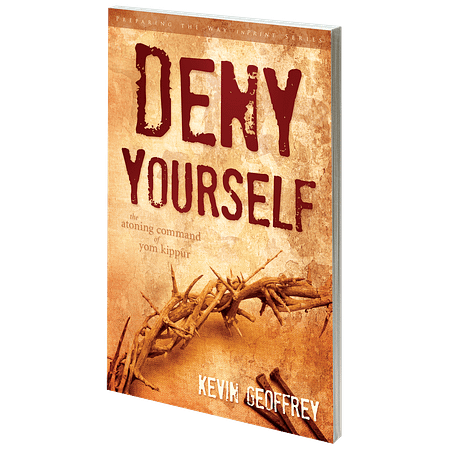Deny Yourself: The Atoning Command of Yom Kippur
Excerpts from Kevin’s book of the same name.
In Jewish tradition, the phrase “deny yourself” is essentially an instruction to fast—to not eat or drink for the duration of Yom Kippur—such that one denies himself of that which sustains life. This is clearly a vivid and valid interpretation for how one might conduct himself on this most holy day.
However, we also deny ourselves when we abstain from feeding our appetites and refuse to indulge in the lusts of the flesh. For the disciple of Messiah, this is the very heart of the Spirit-led life, as encapsulated in Galatians 5:16, “Walk in the Ruach, and the desire of the flesh you will not bring to its goal” (mjlt).
We deny our flesh’s “self” by depriving it of gratification—refusing to satisfy its hunger. Since the ways of the Spirit cannot please the flesh, it must eventually succumb from a lack of sinful nourishment. In this way, we assassinate our flesh, and deny it its self. The only battle that can successfully be waged against the flesh is the one which denies it life. When we avoid sin and say “no” to temptation, only then can our flesh be kept from satisfying and gratifying itself. This is spiritual, yet practical warfare that significantly accomplishes self-denial.
This, then, is what it means to deny ourselves: as the Master subjected Himself to death for the sake of our sins, so must we put ourselves to death for the sake of the Master. Only in this self-denial will we receive the power to be transformed—to be like the Master, to follow in His ways—and fulfill the call on our lives as His disciples.
Hear the words of Paul from Philippians 3:10.
I want to know Him, and the power of His Rising Again [Resurrection], and the sharing of His sufferings, being conformed to Him in His death… (mjlt)
Paul firmly grasped the obvious truth about resurrection: before one can be raised from the dead, first, he has to die. This is The Way to life that the Master showed us by first giving us life through His death. Now He beckons us to follow His example—to lay down our lives—before we can truly know His power. Paul plots this course from death to life for us in Romans 6:3-4.
Are you ignorant that we—as many as were immersed into Messiah Yeshua—were immersed into His death? Therefore, we were buried together with Him through the immersion into the death, so that even as Messiah was raised up out of the dead, through the glory of the Father, so also we might walk in newness of life. (mjlt)
We were immersed into Yeshua’s death, then buried and raised with Him to life! Our “sharing” with Him is not simply in “newness of life.” Rather, we are first to share in His sufferings, becoming like Him in His death. Such is the spirit of Paul’s binding oath in Philippians 1:20-21, which we are all exhorted to take.
…and according to my eager expectation and hope, that I will be ashamed in nothing. Rather, in all freedom—as always, also now—Messiah will be magnified in my body, whether through my life, or through my death. For to me, to live is Messiah, and to die, gain. (mjlt)
If we are not prepared to die to self, how much more will we be unprepared to literally die for the sake of the Good News? Is such a conviction—”by life, or by death”—reserved only for the most holy; the most devout; the apostles of old; or the martyrs of days past, present and future?
No!
This must be our conviction—the command we all heed: deny yourself, and be immersed in the Messiah’s suffering and death. Then, in resurrection power, we will be raised again into new life—for the glory of the Father!
This is our true calling as disciples of the Master Yeshua: one way or another—”by life, or by death”—we must “lose” our lives for Him.
How have you been (or not been) practicing self-denial in your own life? Share your thoughts below!






One way I can practice denying myself is by being to others what I would like done. In other words, to ” do nothing out of selfishness or conceit, but with humility consider others as more than yourselves (myself), looking out not only for your own interests but also for the interests of others” *Philippians 2:3,4, TLV). It is not easy by any stretch of the imagination but Ruach Ha Kodesh empowers us to be obedient!